New clients often come to us feeling guilty and weak after a holiday season, a vacation, or a long weekend of overeating. Our response often surprises them. Because we know that there are some surprising benefits of overindulgence and key lessons that eating too much can teach.
- Want to listen instead of read? Download the audio recording here…
++++
Thanksgiving. Valentine’s Day. The first big summer BBQ. A family reunion at the beach.
Throughout the year, new clients come to us feeling guilty and terrible about eating (and drinking) too much at [insert the latest festivity here].
With a cocktail of regret, shame, and resolve to “do things better”, they tell us how “bad” they’ve been. And how ready they are to shape up once and for all.
Our response often surprises them.
Because it’s not, “drink water” or “get more fiber” or “focus on clean eating”.
It’s actually:
Maybe you needed to overindulge.
Record scratch.
Why would a health, fitness, or wellness coach ever say that?
Because overindulgence has several important — and vastly underrated — roles to play in the bigger picture of health, fitness, and nutrition.
Here are four of them:
Lesson #1. “Slipping up” is a necessary part of change, progress, and success.
We often imagine change or “progress” as a linear graph, like this:
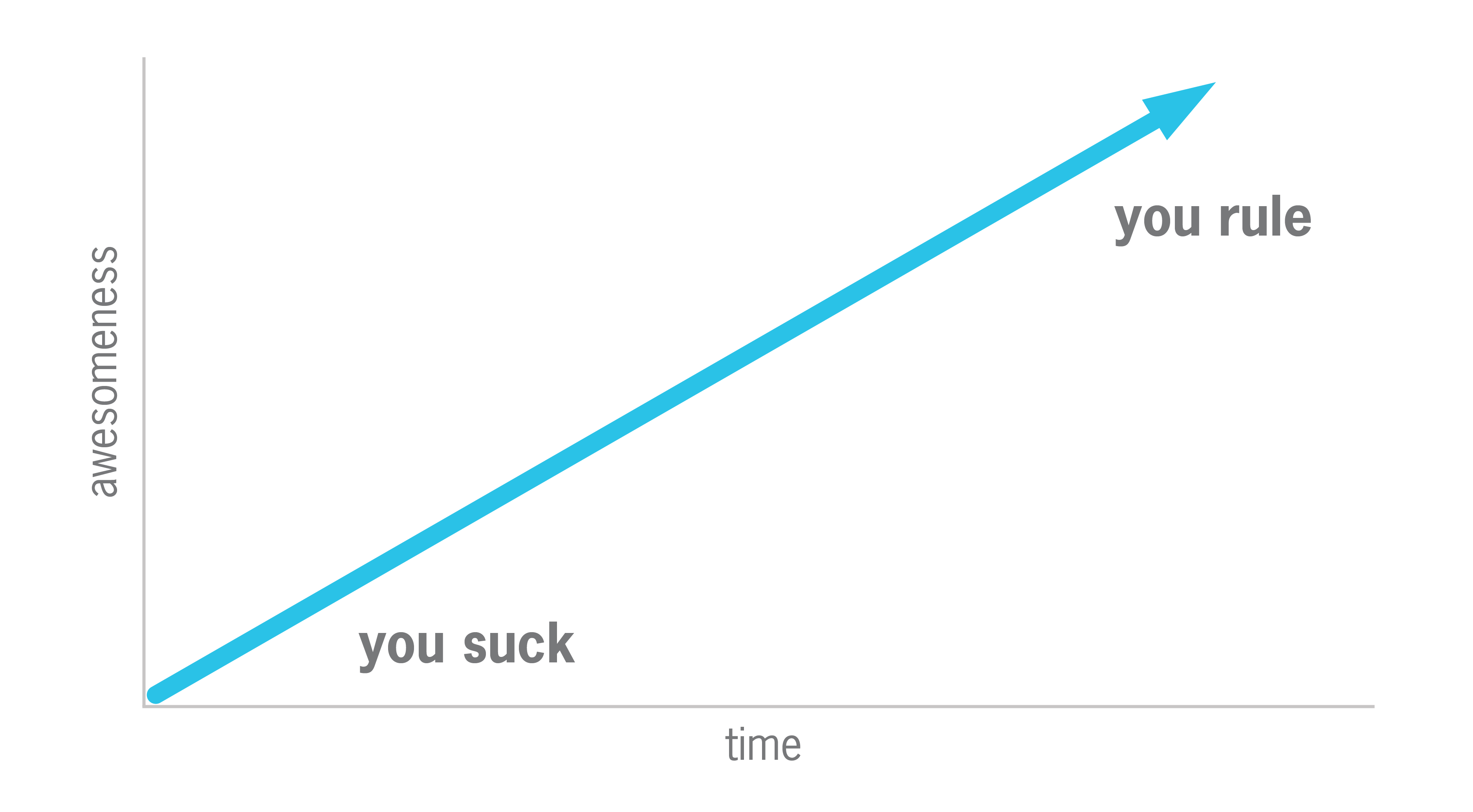
Every day, we get better and better, until eventually we’re perfect, fit, godlike creatures who’ve Got Everything Together.
In reality, change and progress look more like this:
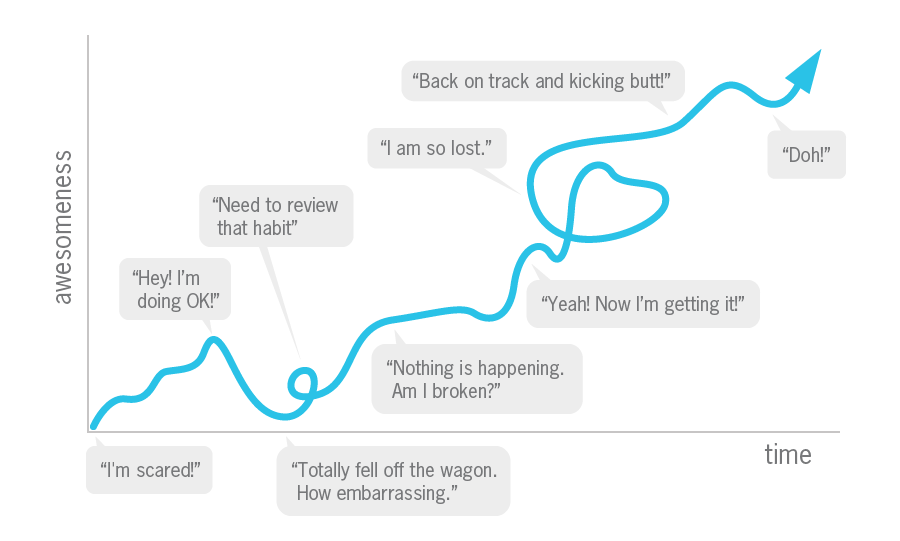
We wholeheartedly embrace better food choices for a bit, then eat macaroni and cheese for a week, then ace our new habits for a while, and then a business trip throws us off for a minute, then we’re back on the horse…
From week to week or month to month, our cycles and rhythms are like a Slinky (or a coil) that’s been stretched like this:
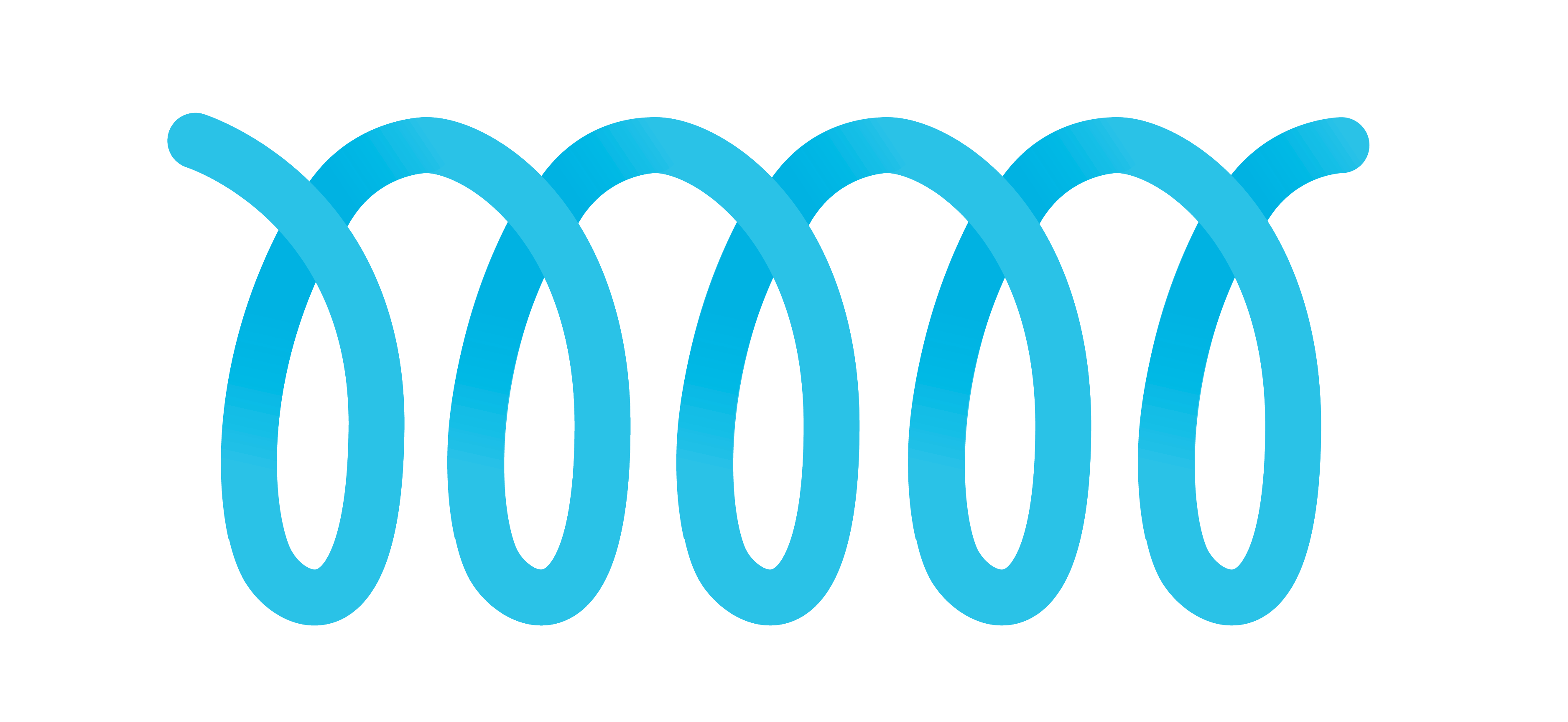
We try something new and move forward, or upward, bubbling with excitement and energy.
Then we cycle. Life throws us a situation that tests our new approach. Progress pauses, or dips downward, or goes backward.
Up, down, forward, back.
There are a number of perfectly good reasons for this:
- Maybe we need to go back to re-open or revisit something — to reconsider an idea that didn’t grab us right away, or address a question we avoided answering when first asked.
- Maybe we need downtime — to think, reflect, regroup, reboot, or incubate something new.
- Maybe we need to regress briefly — to dip into our old selves or old habits and remember why we are building new ones, like visiting an ex to remember why you left them.
- Maybe we need to repeat something — to practice, drill, and/or test our skills under different conditions.
Or maybe it’s that we simply don’t have the skills yet to reach the next level of our progression and, like everything else in life, we need to accept that doing things badly is a necessary precursor to doing them well.
Regardless of the reason, weight loss progress can stop or even go the opposite direction. And that usually happens on the tail end of a stretch where we’ve put our exercise regimen on hold, or dived into a week-long food orgy.
That’s why almost every weight loss graph looks like this.
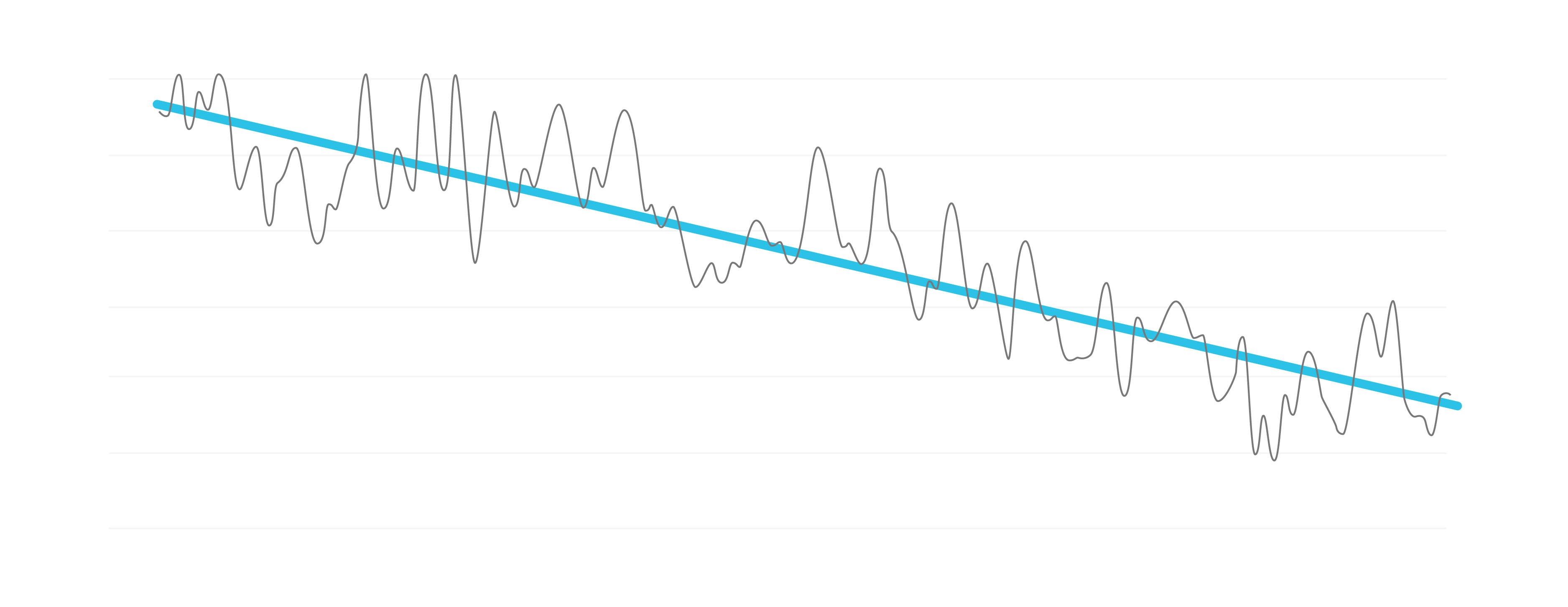
The trend is headed in the right direction, but the day-to-day and week-to-week fluctuations feel turbulent.
But that’s not because every single person trying to lose weight sucks, has no discipline, and can’t do weight loss correctly.
Rather, based on our experience with over 150,000 clients and patients, it seems like dips, plateaus, and everything in between are actually necessary.
Both physiologically and psychologically.
Perhaps that’s why they’re so normal.
Which leads us to…
Lesson #2. Indulgence offers an opportunity to ask the bigger questions (and learn some stuff).
Our indulgences — even the ones we ultimately regret — can serve as amazing learning opportunities, if we let them.
Oftentimes, new clients feel ashamed when they feel they’ve overindulged. They just want to hide from their “mistake” and “start over”.
Instead, we encourage them to use overindulgence as the impetus for self-reflection.
This practice helps them get into the habit of observing and learning from what’s going on in their lives and bodies (rather than judging and self-shaming).
For example, we might ask:
- What job is indulgence (or celebration, or reward) doing for us?
- How important is that for our lives?
- What kind of person are we when we’re indulging?
- What is good about not doing anything differently?
Clients are often (rightfully) confused when we ask these kinds of questions.
“What could possibly be positive about this?” they want to know, pointing to empty ice cream cartons and a recycling bin full of beer cans.
But here’s the truth: We do the things we do for a reason.
That indulgence, no matter how big or regrettable, is doing a job for us. It’s somehow solving a problem for us, even if not very well.
Recognizing how our behaviors serve us — even “bad habits“ like four cocktails with a junk food chaser — can help us put resistance aside, stop hiding, and see things more clearly.
What need is the indulgence is fulfilling?
And what would be a more valuable/health-affirming way to fulfill that need?
Though it might seem counterintuitive, cutting our bad habits some slack and acknowledging what role they play for us, can actually lead to deeper, more lasting change.
Lesson #3. “Sometimes you need to fall off the wagon to want to get back on again.”
Recently, I shared a large, hearty meal with my friend (and PN food photographer) Jason Grenci.
As the meal was winding down — about the time belt buckles started to loosen and regret threatened to creep in — Jay waved his fork in my general direction and, through a mouthful of pickled beets, dropped this insight bomb:
”Nah. There’s nothing bad about this. Sometimes, you need to fall off the wagon to want to get back on again.”
He was right.
Not only is ‘falling off’ a part of change, but it can also make getting back on feel pretty darn good.
Let’s be honest: Few things motivate healthy choices better than waking up with the meat sweats, heartburn, a hangover, or some other uncomfortable form of bodily rebellion.
And even if you feel perfectly fine after having fun, there’s still an intuitive natural shift that winds the party down.
Perhaps taking a short break from more structured, healthy choices allows us to keep making those choices in future.
It’s the way blowing off a workout to sit on the couch, read trashy novels, and drink too much coffee actually gives you that I-can’t-wait-to-hit-the-gym buzz.
Or the way taking a vacation and making full use of the “all inclusive” swim-up bar and breakfast buffet makes you happy to come home, hit the grocery store, and stuff your fridge with green vegetables.
While you might fear that one indulgence will lead to a lifetime of chaos, research shows that we naturally adapt to pleasure in such a way that — assuming we have at least some interest in our own health and fitness, and perhaps the support of a team or coach — we naturally self-correct.
Lesson #4. Healthy indulgence might actually support “deep health”.
Spend a bit of time hanging around Precision Nutrition, and you might hear a phrase called “deep health”.
Deep health means thriving in all domains of life: physical, mental, emotional, social, etc.
Deep health means:
- We are physically robust and resilient, able to act effectively in the world and enjoy a high level of physical function.
- Our minds are wise, agile, and kind, helping us solve problems creatively and make thoughtful choices that align with our deeper principles.
- Our emotions are available to us and used for good — to take action, to signal something that we need to attend to. Overall, our balance of emotions is positive.
- We enjoy healthy, strong, affirming relationships and a variety of high-quality social connections.
- We are constantly growing and developing, repairing and recovering, strengthening and flourishing, in whatever ways we are able to do so.
With deep health, we are moving in a “life-forward direction”.
By this definition, a “healthy indulgence” is one that is somehow:
- meaningful
- truly enjoyable
- self-fulfilling
- life-affirming
We are fully present for this indulgence. We are more alive because of it.
Non-food examples of healthy indulgences include: playing hooky from work to go hiking with your kids, or see that great movie / big game you’ve been dying to see, or get a decadent massage and soak happily in a hot tub.
Conversely, an unhealthy indulgence might be:
- meaningless
- an empty distraction
- self-destroying
- life-detracting
An unhealthy indulgence might be going out and getting trashed on crappy-tasting booze that you chug rather than sip, with people you don’t particularly like, who then encourage you to pick up that smoking habit you’ve been trying to kick.
Interestingly, a healthy indulgence often seems to have its own natural resolution.
At the end of a healthy indulgence, we often feel satisfied and content.
Let’s say you’re a parent who works hard, and then healthily indulges yourself with “me” time and rest.
After some delicious sleeping-in while the kids stay overnight at Grandma’s, you pad around the house in your pajamas, yawning happily and lazing over the Sunday paper.
And then you shower, get in the car, and go pick your ducklings up — excited to see them, ready to enter the parental fray again.
You can’t sleep in forever, nor do you really want to. But sleeping in, getting that “you” time, recharges your batteries and comes to a natural end.
Conversely, an unhealthy indulgence often doesn’t resolve. It may even be actively unsatisfying.
We might try to get the “hit” from it over and over with no results, like playing the slot machines repeatedly with no payout, not even enjoying yanking on that lever but feeling driven to do it anyway.
Plus, if we’re caught in a cycle of binge-and-restrict, indulgence can be part of a pendulum that swings back and forth between chaos and rigid order forever.
In this case, “indulgence” might be code for all-or-nothing. You’re either strictly self-monitoring or utterly, bizarrely impulsive and irrational:
ME MAKE CHOCOLATE PEANUT BUTTER WHISKEY CIGARETTE BACON GRAVY MILKSHAKE NOW NOM NOM NOM.
(Of course, compulsive bingeing is not part of deep health and can be hard to break without help from a doctor or therapist.)
In the end, what if we stopped trying to prevent our indulgences, and accepted them instead?
What if we treated “back” or “down” or “off the wagon” periods as a natural and normal part of the entire experience of change and growth?
I mean, look at how commonly people experience these periods. With that level of frequency, isn’t it time we asked whether they’re important instead of just something to tolerate or “get through” on our way somewhere else?
Isn’t it time we examined them, dare I say respected and appreciated them?
What if they turned out to be fuel for our “forward” and “up” periods?
And what if we all ended up healthier, happier, and even fitter, for them?
What to do next:
Some tips from Precision Nutrition
Try these next steps to learn to embrace your indulgences in a health-supporting way.
1. Ask the questions.
Consider the following…
What does a “healthy” indulgence look like for you? Why?
- What kind of indulgence would enable and promote “deep health” and balance for you?
- What kind of indulgence would inspire you, replenish you, and get you back on the path to deep health again?
What does an “unhealthy” indulgence look like for you? Why?
- What things leave you unsatisfied, regretful, frustrated, demoralized, and/or feeling “stuck” in negative patterns?
2. Be honest, thoughtful, and grown-up.
Avoid playing mental games like “If I’m ‘good’ then I get to be ‘bad”, or “If I pretend I didn’t eat the cookies, then it didn’t happen”.
Face your behavior with open eyes, maturity, and wisdom.
Accept that all choices have consequences.
Find a framework for reviewing behaviors and consequences, and zeroing in on what’s “OK” and “Not OK” for you, and for the health you’re trying to achieve.
3. Start building a “flight plan”.
Think of yourself as the pilot of your own life, health, fitness, and nutrition. With that in mind, consider…
- Where are you trying to get to, and why?
- What challenges can you anticipate that might throw you off your ‘healthy’ flight path? What can you do now to prepare for these obstacles and help yourself adapt when they arise?
- Who’s your flight crew? Think about who you have (or who you’d like to have) in your life to help you get to where you’re trying to go. We all need support in our lives — so ask family/friends/coaches for help if you need it.
- What’s your flight checklist? What systems or strategies do you have to help keep you get back on course after a (planned or unplanned) deviation?
4. Notice the cues and signs that tell you it’s time to correct course.
Ideally, you’ll learn the cues that tell you it’s time to change your path before you’re too far in one direction or another.
For instance:
- Perhaps one decadent meal is perfect, but an entire weekend of them will leave you reaching for the Pepto-Bismol.
- Perhaps one missed workout every few weeks actually helps you recover, but a string of couch-potato or desk-monkey days will leave you feeling cranky, lethargic, and squashy.
- Perhaps a few martinis and some champagne over the holidays feels like celebration, but after the festivities wind-down, those weeknight glasses of wine start to feel like an unwelcome habit…
5. Accept — perhaps even embrace — periods of “back”, “down”, and “nothing”.
Play the long game.
If your general direction is “forward” and “up”, and you are, overall, working on “something”, then maybe cycling is part of the process.
Maybe cycling actively, significantly, helps you.
If you’re a coach, or you want to be…
You can help people build sustainable nutrition and lifestyle habits that will significantly improve their physical and mental health—while you make a great living doing what you love. We'll show you how.
If you’d like to learn more, consider the PN Level 1 Nutrition Coaching Certification. (You can enroll now at a big discount.)



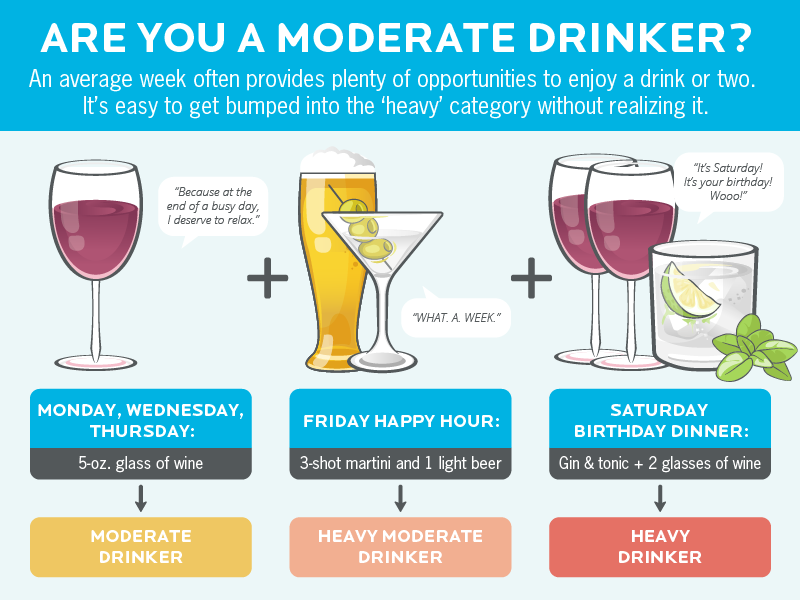
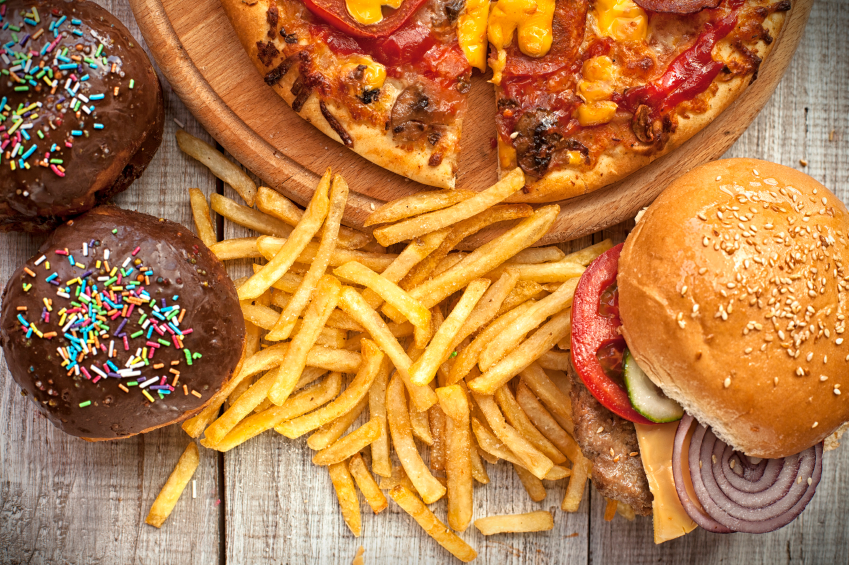
Share